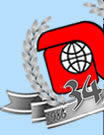 |
|
|
|

 |
 |
Arsan
Tourism and Travel Agency started the "Zeugma/Belkis
Rescue Excavations Support Campaign" which
recieved placement in 52 world projects through
a competition arranged by the American Society of
Travel Agents (ASTA) and Smithsonian Magazine at
the 66 th Asia World Congress which was held in
Bangkok. Ayşe Nur Yılmazer the General Manager of Arsan
Tourism and Travel Agency, presented the Asia Environment
Commitee with a flag of Şahinbey Lions Club in honour
of their support for this project.
and Travel Agency, presented the Asia Environment
Commitee with a flag of Şahinbey Lions Club in honour
of their support for this project. |
 |
The ancient city of Zeugma,
which is found in Belkis village, near Nizip/Gaziantep,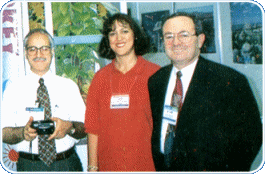 has been located at an easy point to cross the Euphrates
river so it had developed into a very important
pass way. It was" always an important military
and trade center. The banks of the Euphrates river
have been the sites of many wars, since it acted
as a natural border between eastern and western
empires. Alexander the Great had crossed the Euphrates
here on his way to victory in Iran and later in
the Helenistic period it had been rebuilt. During
the Kommagene kingdom Zeugma was one of the four
major cities. In the Roman period, it was the southern
most garnison for the military on the
has been located at an easy point to cross the Euphrates
river so it had developed into a very important
pass way. It was" always an important military
and trade center. The banks of the Euphrates river
have been the sites of many wars, since it acted
as a natural border between eastern and western
empires. Alexander the Great had crossed the Euphrates
here on his way to victory in Iran and later in
the Helenistic period it had been rebuilt. During
the Kommagene kingdom Zeugma was one of the four
major cities. In the Roman period, it was the southern
most garnison for the military on the 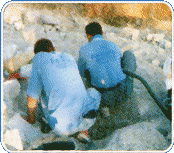 Euphrates. In this period the city developed and
established trade, art and cultural ties with Palmyra
in southern Syria and became enriched, especially
in the 2nd and 3rd centuries A.D. It started losing
its glamour, which it held during the Byzantine
period. It lost its importance due to Islamic waves.
It had already lost much of its importance when
the regional balance changed.
Euphrates. In this period the city developed and
established trade, art and cultural ties with Palmyra
in southern Syria and became enriched, especially
in the 2nd and 3rd centuries A.D. It started losing
its glamour, which it held during the Byzantine
period. It lost its importance due to Islamic waves.
It had already lost much of its importance when
the regional balance changed.
Zeugma, which means "bridge head", had
made great advances in the Roman period in decoration
of villas and I mosaics had developed to a degree
to compete with any such works in the world. Additionally,
the Palmyra influence had developed cemetery sculpture
to new levels.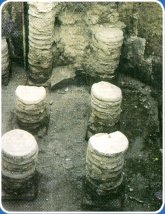
After the Malazgirt war, the Turkish migrants into
Anatolia first saw ancient and impressive architecture
and called the town Belkis in reference to the country
of Bath (Belkis), Queen of Sheba, just as other
towns named Belkis recieved their names (Aspendos-Belkis,
Kyzikos-Belkis).
 |
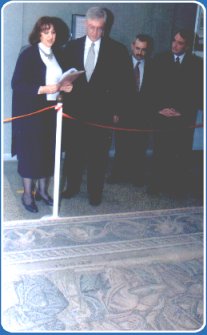 The
site of ancient Zeugma from the 2nd-3rd centuries
A.D., provided barracks for the Roman Legions along
the quiet banks of the Euphates River, the site
has proven to be a treasure house reflecting the
magnificent tastes of this era. The
site of ancient Zeugma from the 2nd-3rd centuries
A.D., provided barracks for the Roman Legions along
the quiet banks of the Euphates River, the site
has proven to be a treasure house reflecting the
magnificent tastes of this era.
Illegal excavations combined with bad roads have
led to the destruction of this impressive civilization
and the final stroke is that this site is to be
covered by the rising waters of the Birecik Dam
Project.
We should not succumb to the fate of most third
world countries by allowing our archeological treasures
to be destroyed by neglect.
We should have brought together all concerned civil
groups and formed good financial resources to repay
our debt to the past.
With these intentions, we joined the project started
by our member, ARSAN Tourism and Travel Agency.
We tried to sell postcards, information booklets
and posters to build up finances. This also led
to recognition of the site by others.
Our releases in international papers and published
articles have been like a cry in the dark. The sincere
support gained was turned over to the Gaziantep
Directorate of Museum and spent on the Belkis/Zeugma
excavations.
The excavations, which are done through the Gaziantep
Directorate of Museum and foreign groups, have brought
to the light of day and protected from ignorant
people this civilization, where they receive more
admiration.
With every passing day, more archelogical knowledge,
other grand cultures and natural wonders are rescued
from a watery grave.
In our race against time, we thank all interested
groups and people who have, or will, provide support
for these efforts.
 |
|
|
|
 |
|
| 

|
|